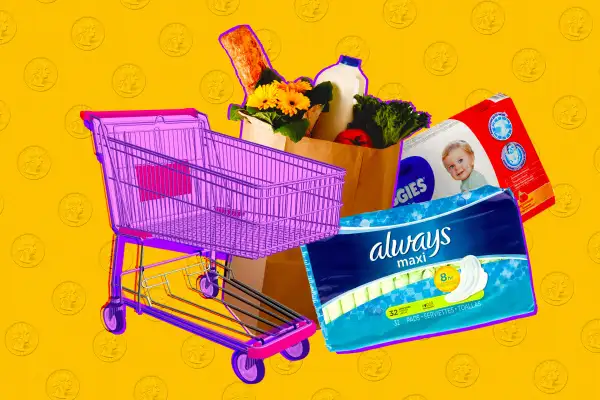This Map Shows Which States Still Charge Sales Tax on Groceries, Diapers and Period Products

Soaring inflation over the past two years has created financial strain for most Americans, perhaps none more so than those already paying a surcharge for necessities.
Consumers and officials alike have pushed in recent years to eliminate or reduce sales taxes on some essentials — specifically, groceries, diapers and period products. But shoppers are still paying taxes on these purchases in many parts of the country.
On top of surging prices at the grocery store, over a dozen U.S. states still charge a sales tax on food. Residents in 27 states pay anywhere from 4% to 7% in state sales taxes on diapers, and 21 states impose taxes on period products.
States with sales tax on groceries, diapers and period products
As our map shows, most states still charge sales tax on one or more of these essential products. People in Idaho and Mississippi fork over a standard 6% sales tax for groceries, the highest rate nationwide. Six states apply reduced sales tax rates for food, but Alabama, South Dakota, Hawaii, Idaho, Kansas, and Oklahoma currently impose a standard sales tax rate of 4% on groceries.
Mississippi and Tennessee charge the highest base sales taxes on diapers at 7%. In 19 states, local taxes on diapers can edge even higher — up to an extraordinary 11% in Oklahoma and 10.9% in Missouri.
Washington, Arizona, South Carolina, Kansas, Tennessee and Alabama allow local taxes on diapers to go as high as 9% to 10%.
According to the Alliance for Period Supplies, many states tax period products — which cost an average $20 per cycle, according to the National Organization for Women — as luxury items with rates similar to makeup and electronics. Indiana, Tennessee, and Mississippi charge the country’s highest “tampon tax” of 7%.
Meanwhile, five states have no sales tax at all: Alaska, Delaware, Montana, New Hampshire and Oregon.
Push to cut sales tax on essentials
The push to eliminate or lower sales taxes on groceries, diapers and period products has gained traction hand in hand with rising inflation, which has fluctuated from 9.1% at its June 2022 peak to 5% registered in March. The latest inflation numbers are the lowest since prices began escalating in mid-2021, but still make everyday goods unaffordable for many Americans, more than half of whom reported living paycheck-to-paycheck in March.
Since 2021, seven states have exempted diapers from sales tax or lowered the rate. North Dakota ended its diaper tax on June 30. Advocacy group National Diaper Bank Network tells Money it's supporting proposals to end diaper taxes in several other states — including Alabama, Tennessee, Kansas, South Carolina, Missouri, Georgia and South Carolina.
Ten states have passed laws or amended their tax codes to reduce or eliminate taxes on period products, and 11 more are considering legislation to do the same this year, according to data from the Alliance for Period Supplies, a sister organization to the National Diaper Bank Network.
In June, Nevada passed a bill to exempt diapers from sales tax, and Texas did the same for both period products and diapers. Nevada residents will vote on the exemption next November in a ballot measure. Texas’ exemptions went into effect Sept. 1.
While groceries are exempt from taxes in most of the country, seven states charge a standard sales tax rate on groceries and six impose reduced levies. This year, Kansas, Virginia, Illinois, Idaho, and Tennessee either eliminated or reduced sales taxes on groceries. Oklahoma, Hawaii, Missouri, Utah, Alabama and Kansas are either advancing legislation or considering proposals to reduce or eliminate grocery taxes.
Impact of sales tax on essentials
For the poorest Americans, the additional cost of sales taxes on essentials can be insurmountable, leading to or exacerbating hunger, obesity and other health problems, especially for young children.
A 2021 study found that households were 3% more likely to experience food insecurity in states with a grocery sales tax of 4% compared to states without the tax.
“These taxes are regressive and disproportionately impact low-wage families and those living in poverty as they pay a higher share of their income in taxes,” Joanne Samuel Goldblum, CEO of the National Diaper Bank Network and the Alliance for Period Supplies, tells Money.
About one in three U.S. families can’t afford enough diapers, according to the National Diaper Bank Network, which estimates a month’s worth of diapers costs $70 to $80 per baby.
Barriers to accessing essentials have educational consequences, too.
The Period Project, an organization that facilitates access to period supplies, reports that 84% of students have missed class or know someone who has due to lack of access to period products. A survey released in 2021 by the brand U by Kotex found that more than a third of low-income people who menstruate report missing work, school or other events due to financial barriers to period products.
This story was updated on Sept. 13, 2023, to include legislative changes in Texas and Nevada.
More from Money:
The 7 Most Popular Ways People Are Saving Money on Groceries Now
Best Personal Loans of May 2023
Here's Where People Pay the Highest (and Lowest) Sales Tax in America


